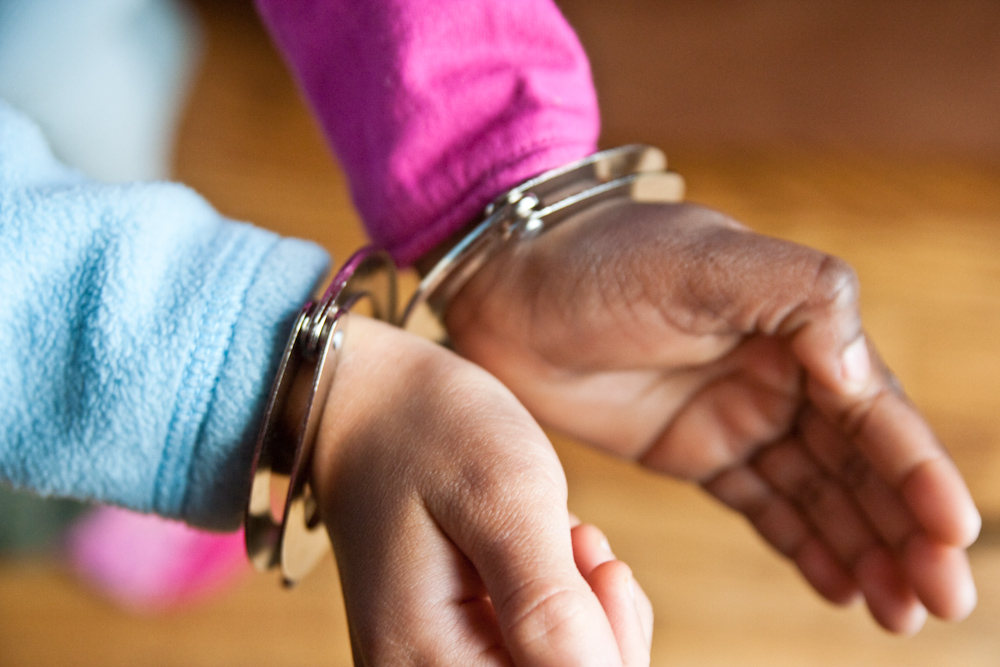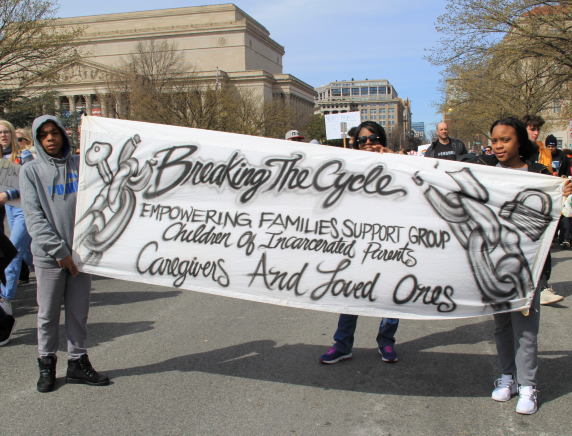Broken Hearts and Broken Homes: How Mass Incarceration Impacts Children and Families (May)
In May 2019, the Rights Writers discussed what perspectives have been left out of the major debates on their topics and how including them increase understanding or contribute to progress of the issue.
The American prison system is designed to punish individuals for their crimes as a means of preventing them from repeating the same behavior, yet this system serves as a revolving door for many criminals. Recidivism rates show that within three years of release, 68% of prisoners are rearrested and within five years, 77% were rearrested. The vast majority of these individuals are arrested for non-violent crimes. Current perspectives on mass incarceration seem to only critique the efficacy of a punitive system and speak on the nature in which our current system violates basic human rights. Little emphasis has been put on how recidivism rates and the criminal justice system impacts children and families, but this framing can impact the way in which mass incarceration is seen as a human rights issue.
Debates on the issues of the criminal justice system are currently focused on the manners in which the human rights of prisoners have been violated. Advocacy coalitions such as the ACLU and NAACP emphasize how prison practices, arrest protocol, and the quality of the facilities do not reach the bare-minimum standard of human rights. These groups fight for the right to improve the lives on the individual level but only emphasize how black men in particular are targeted at more than 5 times the rate of whites. It is common for people to have difficultly empathizing with prisoners because they only view them as prisoners. Individuals may be more inclined to challenge the criminal justice system if they had knowledge of how it affects families.

Research estimates that over 5 million children have experienced an incarcerated parent at some point in their lives. The vast majority of incarcerated mothers and fathers lived with their children prior to imprisonment. At least 32,000 incarcerated parents have had their children permanently taken away from them without evidence of abuse, but other factors related to poverty may be involved. Over 5,000 of these prisoners have lost their parental rights due to imprisonment alone. Research shows that mass incarceration is a system that primarily locks up lower socioeconomic class men. Black and minority men are disproportionately imprisoned because they are more likely to be lower class than white men. This proves to have a detrimental impact on families because children experience a loss of financial support, even when fathers did not live with their child, because many still provided support prior to incarceration.
The impacts of the loss of a parent are seen as one out of every three black boys can expect to go to prison at some point during their lives. Black boys are then criminalized at a young age, as by the age of 10, they are begun to be seen as less innocent than their white peers. This allows for black youth to lack equal rights in dignity, for they are criminalized throughout their childhood. An overwhelming 92% of parents behind bars are fathers, with the rates of mothers in prison increasing as well. These children are stripped of the opportunity to get to know their parents unless they have the privilege of being able to undergo a consistent visitation process, and many young black boys are left without a father figure.

Children with incarcerated parents are more likely to experience mental health issues and have difficulty performing well in school. This burden is often carried with the child throughout their lifetime, as they are more likely to experience poor mental and physical health throughout adulthood as well. Because of the emotional distress of having an incarcerated parent, these children are more likely to have disciplinary issues in school. Zero tolerance policies then push these children out of school and allow for the school-to-prison pipeline to form, increasing the likelihood that they will be imprisoned at some point in their lives.
Mass incarceration has become one of the most pressing human rights issues of our generation, with the prison population increasing at a rate of over 700% from 1970 to 2010. Our current system thrives on the use of punitive punishment in hopes of deterring criminals from repeating their crimes. This does little to prevent instances of rearrests upon release from prison, and has a ripple effect and children, communities, and families. The desire to punish individuals for this crime in our current system allows children to become collateral damage and increases their likelihood of experiencing incarceration at a future point in their lives.
Understanding the holistic impacts of incarceration, rather than just on an individual level can help shape the future of criminal justice system reform. Perhaps a greater emphasis on the impacts of children and families can help to shift the American system to one that is more rehabilitation based. Doing so will help the incarcerated individual to have an experience of recovery so that they may be able to improve for the sake of their family.
